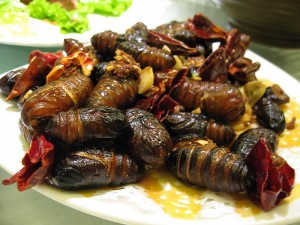It has been known for some time now that honey has several antibacterial properties, having been employed by many ancient civilizations as a topical treatment for wounds. Honey is an effective treatment against antibiotic resistant bacteria because it effectively attacks bacteria on multiple levels having hydrogen peroxide, acidity, osmotic effect, high sugar concentrations and polyphenols in its arsenal to kill bacterial cells. This makes it very difficult for bacteria to develop resistance to all of the effects of honey simultaneously.

Honey (Image Source: Wikimedia Commons)
Dr. Rowena Jenkins and her team from the University of Wales Institute – Cardiff looked at the antibacterial properties of honey on bacteria that infect wounds. They determined that it wasn’t only the sugar present in honey but other factors that helped kill the bacteria. In their experiment they noticed that one particular protein, called FabI, was entirely missing after the honey treatment. This protein was particularly responsible for fatty acid biosynthesis and without it bacteria couldn’t produce the lipopolysaccharides that are essential to build bacterial cell walls. However they could not isolate which particular element of the honey was responsible for completely destroying the protein.
Another research paper, published the year following Dr. Jenkins work, in the Federation of American Societies for Experimental Biology (FASEB), isolated the protein which was responsible for most of the antibacterial properties of honey as defensin-1. This protein, the researchers proposed, is added to the honey by the bees that make it and is part of their immune system. Further research into this protein could pave the way to finding treatments that bacteria cannot develop resistance to and even kill antibiotic resistant bacteria.

Honey Bee (Image Source: Wikimedia Commons)
Additionally, Professor Rose Cooper from the University of Wales Institute Cardiff has experimented on the interactions between three types of bacteria and honey, concluding that honey could even have an effect that reverses antibiotic resistance. One of the bacteria she was studying, Meticillin-resistant Staphylococcus aureus (MRSA), was shown to become more sensitive to the antibiotic oxacillin when used together with honey. This brings about the proposition that antibiotics should be coupled with honey in treatments to increase their potency and also decrease the chances of bacterial resistance developing.
The research invested into the antibacterial properties of honey show that it is a very effective treatment that should be included into modern medicine in a larger scale. Currently certain medical grade honeys are used in the treatment of infectious wounds. These honeys are handled very differently to conventional honey to avoid contamination as they come in contact with exposed body tissue.

Further research should be carried out to determine ways in which to administer antibiotic-honey coupled treatments for a greater, less risky effect that has the potential to eradicate antibiotic resistant bacteria.
~Adil Cader.




